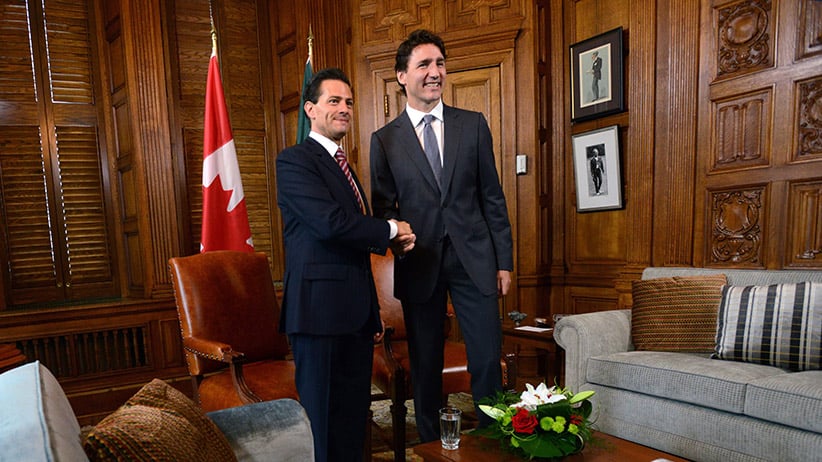Canada and Mexico talked NAFTA post-Trump
The other NAFTA partners reached out to one another before making overtures to the incoming President
Prime Minister Justin Trudeau meets with Mexican President Enrique Pena Nieto in his office on Parliament Hill in Ottawa on Tuesday, June 28, 2016. (Sean Kilpatrick/CP)
Share

OTTAWA – Canada and Mexico reached out to each other while preparing similar public messages last week about working with Donald Trump before the two American neighbours both declared themselves willing to talk with the U.S. about NAFTA.
Two federal sources say the two governments spoke by phone prior to Canada’s public comments about NAFTA the day after the U.S. election – comments that were followed by a similar statement later in the week from Mexico.
The leaders of the two countries also chatted – Prime Minister Justin Trudeau and Mexican President Enrique Pena Nieto spoke later in the week after their governments had discussed their intentions on trade.
“I don’t think anyone was surprised,” one Canadian official said of the announcement last Wednesday.
Every trade deal can be improved, so if the next president wants to discuss reopening NAFTA, Canada is ready to come to the table, David MacNaughton, Canada’s ambassador to the U.S., told a briefing the day after the vote.
He even suggested a possible improvement: adding softwood lumber to the agreement, so that the countries don’t continue re-litigating the issue every few years.
Related: What happens when the walls go up?
Softwood is one of several issues a Trump administration would want to adjust in the North American Free Trade Agreement, according to a purported transition memo obtained by CNN.
Others reportedly include currency manipulation, lumber, country-of-origin labelling and environmental and safety standards. On Day 1 of his presidency, Trump would inform Canada and Mexico of his intention to change NAFTA – or have it cancelled, CNN described the document as saying.
Canada and Mexico didn’t wait. The day after Canada’s announcement, Mexico’s foreign minister said her government was ready to sit down and discuss NAFTA, its merits and possible ways to modernize it – without renegotiating it entirely.
The snap announcement caught some off-guard. Interim Conservative leader Rona Ambrose criticized the move, accusing the government of jumping the gun. Others suggested the rush to the table had weakened Canada’s negotiating position.
But Canadian officials said it was carefully considered.
The first thing it does, according to two sources, is remove some of the drama from an early conversation. One official pointed out that NAFTA has been adjusted multiple times over the years with little drama or tension.
In 2009, more liberalized rules of origin were introduced for agricultural, industrial, mineral fuel and oil products. In 2001, changes were made to the dispute-settlement process. In 2004, it was adjusted to allow easier entry for actuaries and plant pathologists.
Canada has been hoping for years to modernize the visa rules – NAFTA allows easier access to visas for a list of professions that is now out of date, with almost no references to occupations related to the digital economy.
“The idea that we would say, ‘No, we’re not going to talk,’ is unrealistic,” one official said. “We’re always looking to improve agreements… (We’re always asking): ‘How do you make trade work for regular people?”’
He said Canada wanted to avoid an unnecessary first fight – why antagonize, he said, the most important foreign partner without even sitting down to consider improvements that might benefit workers?
Related: Is NAFTA a goner? Don’t bet on it. We’ve heard this before.
A concern about negotiating with Trump is his frequently articulated view on negotiation and trade: a zero-sum view of winners versus losers where – in his own words while writing about business deals – the goal was to crush the competition.
Yet the Canadian move was praised at a panel the other day in Washington. All three panellists at an event at Johns Hopkins University on the election effects on Canada-U.S. relations said it was wise.
”The right thing to do is exactly what the prime minister has done. That is to initiate discussion, to engage, right at the beginning,” said Charles Doran, director of Canadian studies at the school.
”It’s very important for Canada to get started with that conversation early. I think that was very smart.”
Dan Restrepo, a former adviser to President Barack Obama, said one challenge is figuring out what Trump wants – he never specified it during his regular campaign rants against NAFTA.
Canada needs to build a good relationship with the incoming president, which could give it leverage in other international discussions, he said: “Engage, engage, engage.”
”I think both governments have been wise in saying that they are open to (talking NAFTA),“ said Restrepo, the former principal adviser to Obama for Canada, Latin America and the Caribbean.
“I think there is value in sitting down and even seeing what that conversation looks like.”